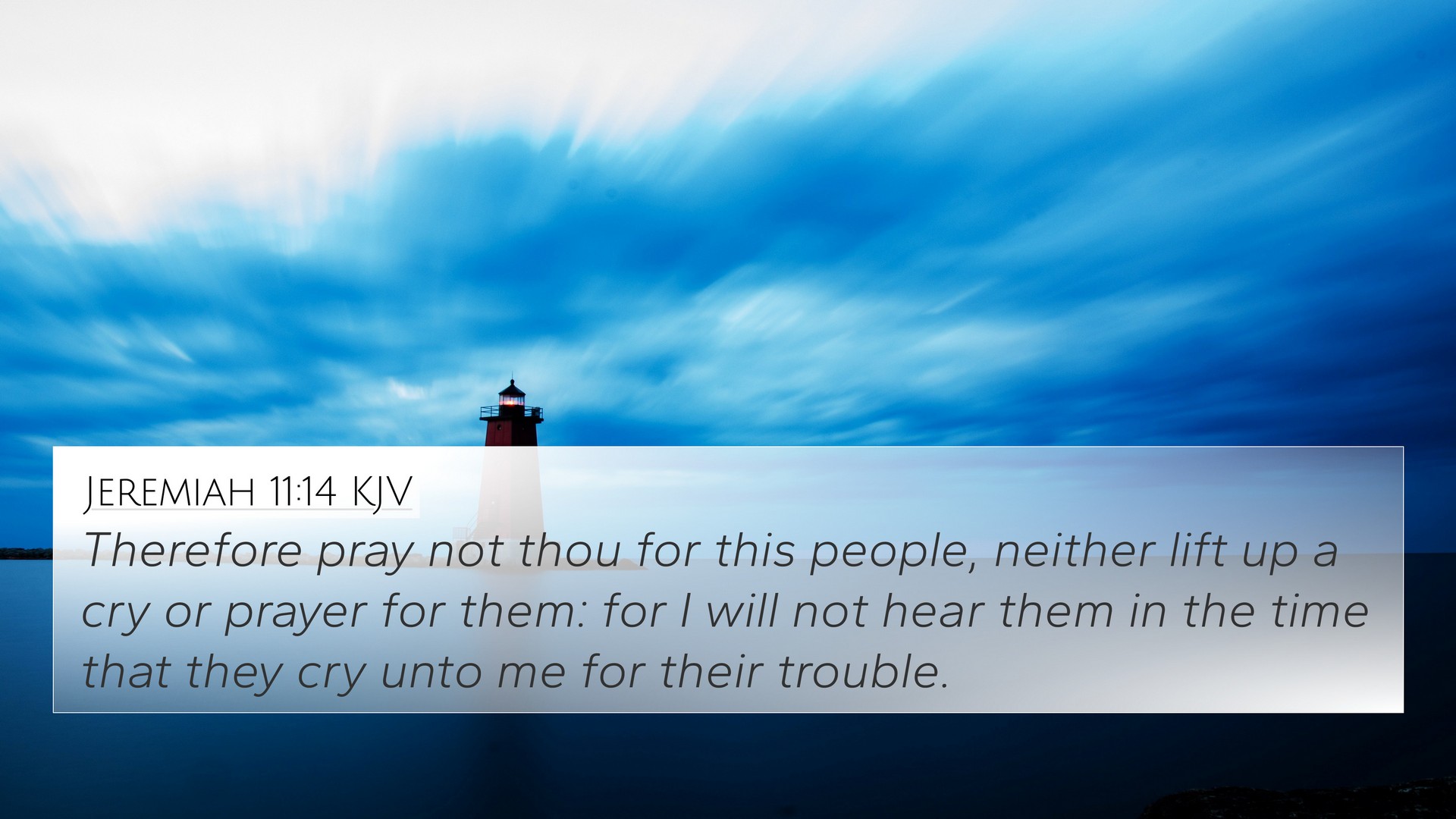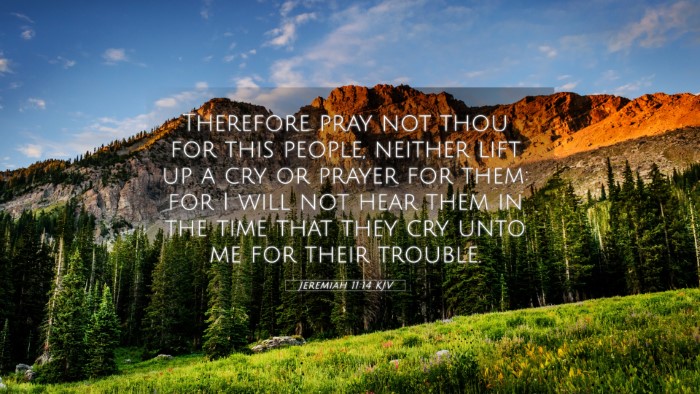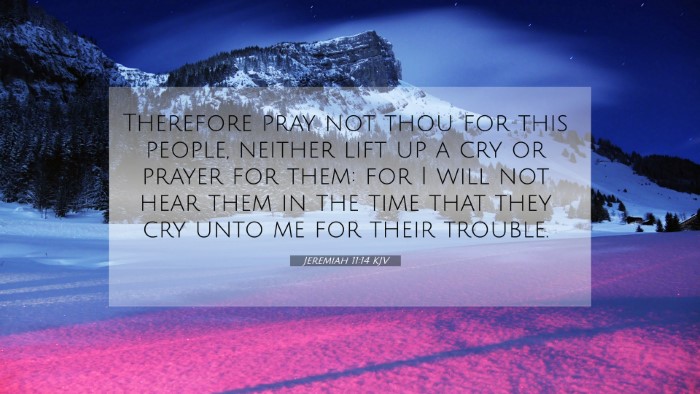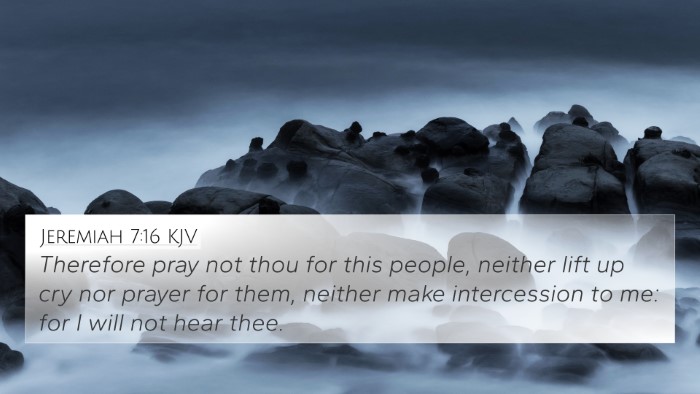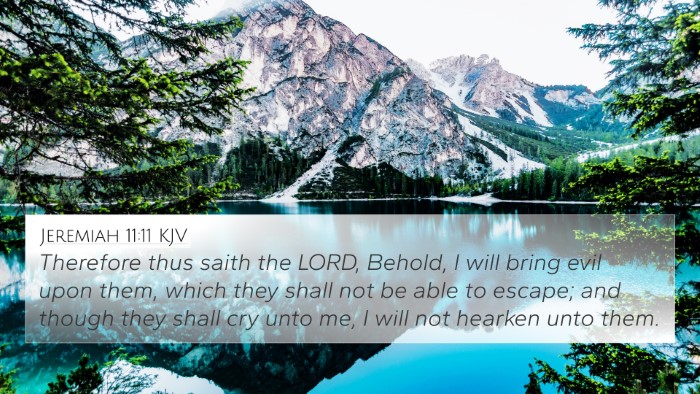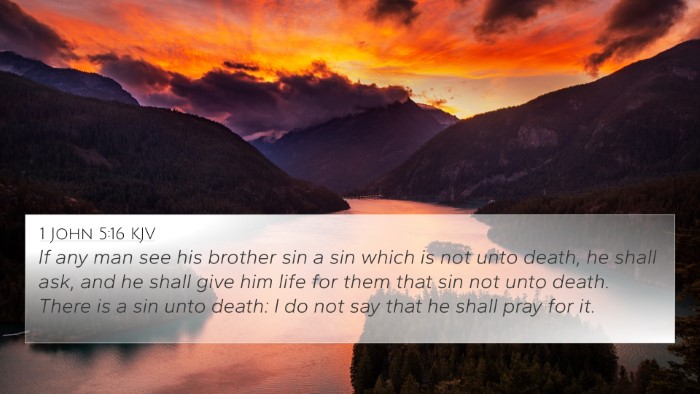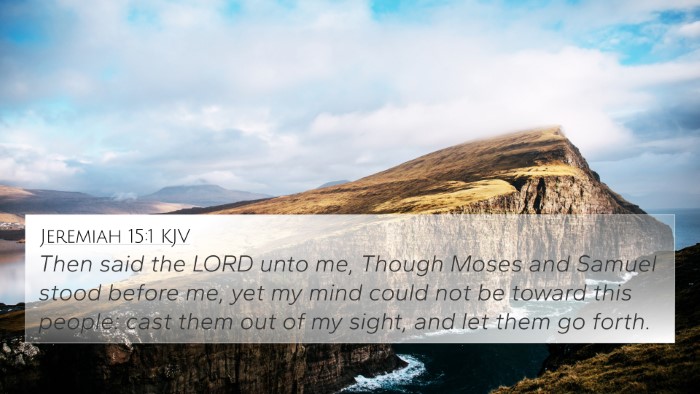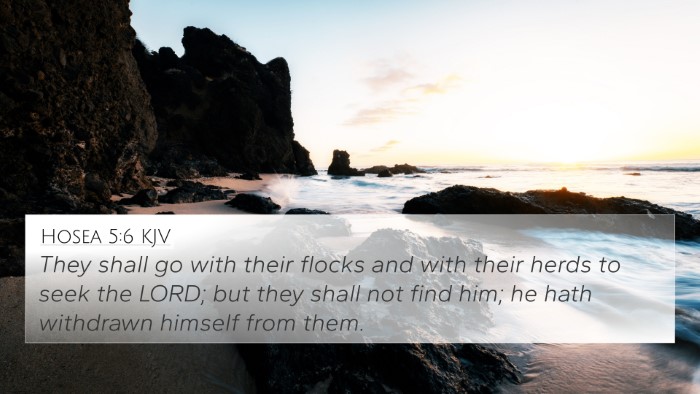Understanding Jeremiah 11:14
The verse Jeremiah 11:14 reads, "Therefore pray not thou for this people, neither lift up a cry nor prayer for them: for I will not hear them in the time that they cry unto me for their trouble." This passage carries significant weight in its implications about prayer, intercession, and divine judgment. The insights from public domain commentaries provide a rich understanding of its meaning and context.
Context of Jeremiah 11:14
This verse is set within a larger context that deals with the covenant relationship between God and Israel. Jeremiah, the prophet, is in the midst of declaring the impending consequences of the people's disobedience and lack of faithfulness. His message serves as a crucial warning against idolatry and the breaking of God’s commandments.
Commentary Insights
- Matthew Henry: Emphasizes the severity of God's stance towards a people who have continually turned away from His commandments. He notes that God communicates His unwillingness to hear the prayers of the people as a direct consequence of their rebellion. Henry highlights that this verse underlines the futility of intercession when the hearts of the people are hardened.
- Albert Barnes: Points out that this command to cease prayer was a response to the persistent disobedience. Barnes elaborates that the verse illustrates God's justice; He will not be appeased by hollow cries from a people who have rejected His ways. This is a stark reminder that true repentance is necessary for restoration.
- Adam Clarke: Provides an emotional insight into God's mourning for a people that have rejected Him. Clarke indicates that the refusal to hear their cries signifies a withdrawal of divine support. He warns about the dangers of persistent unfaithfulness, suggesting that this disengagement can lead to destruction.
Thematic Connections
This verse resonates with numerous themes in Scripture, particularly regarding prayer and divine response. It underscores the necessity of sincerity in prayer and the stark realities of divine judgment. The interconnectedness of biblical texts offers a deeper understanding of its implications.
Bible Verse Cross-References
- 1 Samuel 8:18 - "And ye shall cry out in that day because of your king which ye shall have chosen you; and the Lord will not hear you in that day."
- Proverbs 1:28-29 - "Then shall they call upon me, but I will not answer; they shall seek me early, but they shall not find me: For that they hated knowledge, and did not choose the fear of the Lord."
- Isaiah 1:15 - "And when ye spread forth your hands, I will hide mine eyes from you: yea, when ye make many prayers, I will not hear: your hands are full of blood."
- Ezekiel 8:18 - "Therefore will I also deal in fury: mine eye shall not spare, neither will I have pity: and though they cry in mine ears with a loud voice, yet I will not hear them."
- Micah 3:4 - "Then shall they cry unto the Lord, but he will not hear them: he will even hide his face from them at that time, as they have behaved themselves ill in their doings."
- James 4:3 - "Ye ask, and receive not, because ye ask amiss, that ye may consume it upon your lusts."
- Matthew 7:21-23 - "Not every one that saith unto me, Lord, Lord, shall enter into the kingdom of heaven; but he that doeth the will of my Father which is in heaven."
Related Themes and Interpretations
When considering the connections between Bible verses, Jeremiah 11:14 serves as a reminder of the seriousness with which God takes the faithfulness of His people. The implications of this verse are reflected in many areas of Scripture, emphasizing that a relational disconnect between God and His people impacts their prayers. Here are some thematic connections that emerge from this verse:
- Prayer and Divine Response: The absence of answered prayer is a common theme, found throughout the Scriptures encouraging sincerity and repentance.
- The Role of the Prophet: As seen in the life of Jeremiah, the prophet often bore the burden of interceding for a wayward nation, highlighting the challenges faced in speaking truth to a rebellious people.
- The Nature of Repentance: The necessity for genuine repentance in order for prayer to be heard is emphasized throughout various biblical texts.
Conclusion
In conclusion, Jeremiah 11:14 serves not only as a fierce warning of God's impending judgment but also as a profound teaching on the consequences of spiritual rebellion. The insights gathered from Matthew Henry, Albert Barnes, and Adam Clarke illuminate the gravity of the message delivered by the prophet Jeremiah. Through cross-referencing this verse with others, we can better understand the depth of its meaning and the enduring relevance of its themes in our spiritual lives.
Exploration of Bible Study Tools
For those looking to delve deeper into the connections and implications of Jeremiah 11:14, employing various tools for Bible cross-referencing can enhance understanding. Utilizing a Bible concordance, cross-reference guide, or comprehensive Bible cross-reference materials allows for a more nuanced exploration of the text.
How to Use Bible Cross-References
When utilizing cross-references, it’s beneficial to:
- Identify Major Themes: Determine the overarching themes of your passage.
- Explore Related Scriptures: Use a Bible reference resource to find verses that interact with your text.
- Make Comparative Studies: Analyze how different verses approach similar themes, offering a multi-faceted understanding.
Final Thoughts
As we reflect on Jeremiah 11:14, we are encouraged to maintain sincerity in our prayers, engage in genuine repentance, and understand the dynamics of our relationship with God. The lessons learned through this verse and its connections to the broader biblical narrative offer significant insights for personal faith and communal worship.
